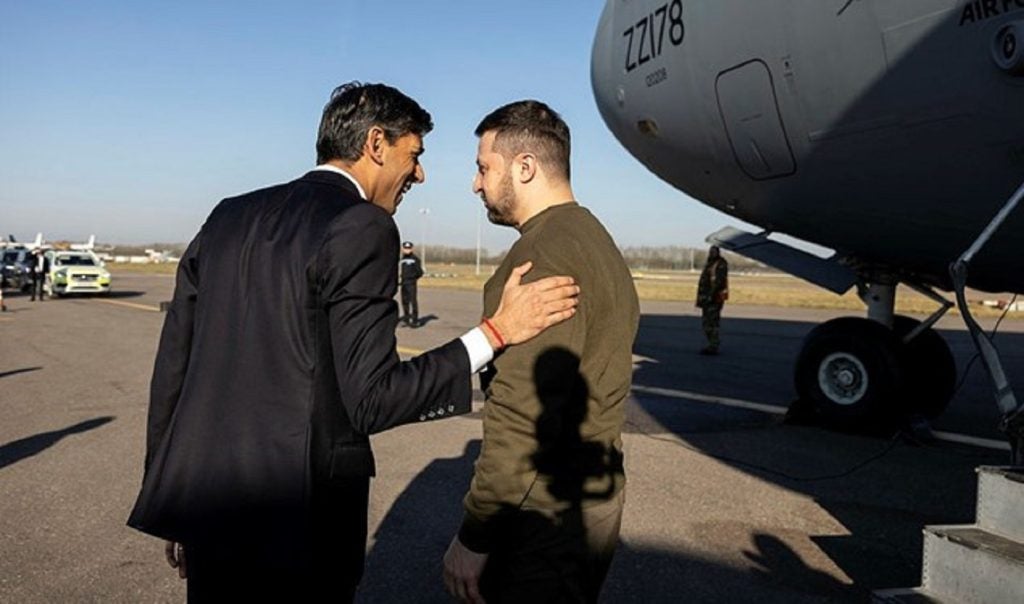Ahead of his visit to Kyiv on 12 January 2024, the UK Prime Minister Rishi Sunak laid out his plans for a new and improved security arrangement to support Ukraine in its war against invading Russian forces.
Britain is the first country to lock-in a bilateral agreement with the war-torn nation – a significant pledge that the G7 nations made at the last Nato summit in Vilnius in July 2023.
While any further US military aid to Ukraine has been suspended for now, European countries are left to bare the burden. Although it is unlikely the continent will collectively offset US funds – which made up 43% of the total value of support – the news of the UK’s promise of support will give some pleasure to the Ukrainian President, Volodymyr Zelenskyy, and perhaps prompt other nations to follow suit.
In addition, there have been efforts to shore up Ukraine's own defence industrial base in recent months as a way to empower the nation as Zelenskyy recently called for a combination of global support as well as collaboration from international defence industries, most recently Polish arms manufacturers.
These new assurances mark what the UK Government believes will set the scene for the start of a "hundred-year partnership."
Taking a page from Zelenskyy's wartime, Churchillian rhetoric, Sunak promised “the UK will not falter. We will stand with Ukraine, in their darkest hours and in the better times to come.”
British raise their funds
The UK-Ukraine Agreement on Security Co-operation formalises a range of support that the UK has been and will continue to provide for Ukraine’s security including intelligence sharing, cyber security, medical and military training, and defence industrial co-operation.
Notably, Sunak also confirmed the UK will provide £2.5bn ($3.18bn) in military aid to Ukraine in 2024/25, an increase of £200m on the previous two years.
The UK Ministry of Defence (MoD) has earmarked these additional funds for a major push to rapidly procure and produce thousands of military drones for Ukraine, including surveillance, long-range strike and sea drones.
“This will be the largest delivery of drones to Ukraine from any nation,” the ministry asserted. “Most of the drones are expected to be manufactured in the UK, and the [MoD] will work with international partners to significantly scale up the number of drones provided for Ukraine’s defence.”
Language will enable greater co-operation
Naturally, the ability to speak the same language is a critical enabler of co-operation, which is why the bilateral deal will also provide additional funding and resources for English language training in Ukraine.
The Ukrainian Government has proposed legislation to promote English in Ukraine, boosting economic competitiveness and diplomatic ties. Today’s announcement will see the UK fund online English lessons for Ukrainians of all ages, as well as providing resources and teacher training.
Ahead of the Ukrainian Air Force receiving F-16 Fight Falcon jets, the US similarly provided essential English language lessons to the pilots in September last year.
Additional commitments against Russian strategy
Additional £18m funds will also be designated for humanitarian aid to Ukraine, building on almost £340m already provided.
Some of that funding will support organisations like the UN and Red Cross to provide humanitarian aid on the frontline, and £8m will go to fortify Ukraine’s energy infrastructure against further Russian attacks.
As the Ukrainian counter-offensive came to a halt as winter set-in, Russian forces orchestrated a retaliatory campaign against civilian energy infrastructure to destroy Ukrainian morale.
However, since mid-December, Russia’s strategy altered when they conducted uncrewed aerial vehicle (UAV) strikes against civilian and military targets in Zaporizhia Oblast; Kryvyi Rih, Dnipropetrovsk Oblast; while Ukraine’s Southern Operational Command reported that a Russian UAV strike damaged an administrative building in Odesa City.
“Russia is likely dispersing its UAV launch capabilities across several locations as both a force protection measure and to complicate Ukrainian air defence efforts,” British intelligence surmised.









